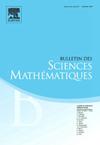Liouville theorems for Choquard-Pekar equations on the half space
IF 1.3
3区 数学
Q2 MATHEMATICS, APPLIED
引用次数: 0
Abstract
We study the following Dirichlet problem to the Choquard-Pekar equation For , and , we prove the non-existence of non-negative solutions by the method of moving planes. As an application of the Liouville theorem in half space and the Liouville theorem in whole space obtained in [13], [28], we carry on blowing-up and rescaling argument on the Choquard-Pekar equation in a bounded domain , and thus obtain a priori estimates on the positive solutions. Based on this estimate and the Leray-Schauder degree theory, we establish the existence of positive solutions.
半空间上乔夸德-佩卡方程的柳维尔定理
我们研究乔夸德-佩卡方程{-Δu=(∫Ωup(y)|x-y|n-βdy)uq,x∈Ω,u(x)≡0,x∉Ω的如下德里赫特问题。对于 1<p≤n+βn-2,1≤q≤2+βn-2 和 Ω=R+n,我们用移动平面的方法证明了非负解的不存在性。作为在[13]、[28]中得到的半空间李厄维尔定理和全空间李厄维尔定理的应用,我们对有界域Ω⊂Rn 中的乔夸德-佩卡方程进行了吹胀和重定标论证,从而得到了正解的先验估计。基于这一估计和勒雷-肖德尔度理论,我们确定了正解的存在性。
本文章由计算机程序翻译,如有差异,请以英文原文为准。
求助全文
约1分钟内获得全文
求助全文
来源期刊
CiteScore
1.90
自引率
7.70%
发文量
71
审稿时长
6-12 weeks
期刊介绍:
Founded in 1870, by Gaston Darboux, the Bulletin publishes original articles covering all branches of pure mathematics.

 求助内容:
求助内容: 应助结果提醒方式:
应助结果提醒方式:


